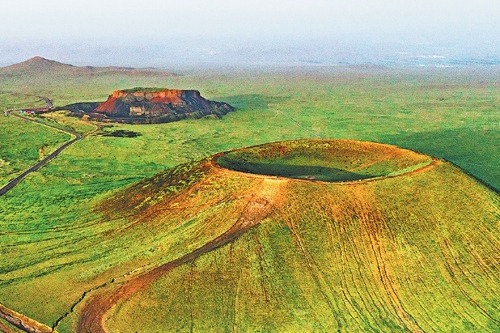Patrolmen protect nature, rescue wildlife
Rangers in Tibet's lowest-lying area work to improve the environment and keep flora and fauna safe from illegal activities

When it's Tenzin Tsering's turn to go on patrol, he gets up before dawn. Then, after a breakfast of hot butter tea and tsamba-roasted barley flour mixed with butter, cheese and tea-he sets out to patrol the dense forest on a motorbike. Even while spending the whole day working in the wilderness, the nutritious breakfast ensures that he never feels hungry.
As he rides along the slippery muddy track through the dense forest, mud from the rear tire splashes into the air, and gradually Tenzin Tsering disappears from view.
He is from Yuljuk village, Nyingchi city, in the Tibet autonomous region. Although the city is considered the lowest-lying area in Tibet, it has the greatest forest coverage and widest range of biodiversity.
With an area covering 5.43 million hectares and with a forest coverage rate of 47.6 percent, Nyingchi is home to 120 species of animals and 110 plants under State protection, according to the city's forestry and grassland bureau.
Tenzin Tsering is one of many patrolmen at the city's environmental public welfare forest, helping to protect the natural forest, land, water and wildlife.
Patrols are vital to these areas, which provide a safe habitat for many species-such as red gorals, brown bears, black bears, snow leopards and black-necked cranes-and are rich with biodiversity.
Tenzin Tsering helps protect the animals from poachers and illness, and also safeguards the natural landscape from deliberate damage.
With their motorbikes, telescopes, water pumps, water bags, radio communications and other facilities, the patrolmen leave footprints in every corner of the forest. Winter is their busiest time because the risk of accidental fire rises as the weather gets drier.
"In winter, the fire risk is a potential danger," Tenzin Tsering said. He added that if illegal logging occurs, it's only a matter of a small number of trees, but a fire could destroy a whole forest, so it's very important to patrol in winter.
In summer, two patrolmen take turns to work as a team while on duty, but in winter, the number doubles to four, he said.
Raising awareness
After arriving at places on the mountains where people herd animals, the patrolmen deliver brochures about environmental protection to help raise awareness of such activities and teach the locals about fire prevention and measures to prevent poaching and illegal logging.
Tenzin Tsering's family herds some 30 yaks and cows, and also plants potatoes, beans, buckwheat, barley, wheat and rapeseed to make a living.
"Now, there are very few cases of hunting, logging, poaching or illegal collection of rocks and sand. The villagers are highly aware of environmental protection. In the past, people's lives were hard, and they had to rely on hunting and logging to live. There were no laws about such activities then," he said, adding that people no longer suffer from hunger or inadequate clothing.
Improved environmental protection may sometimes lead to minor conflicts between villagers and wildlife because animals such as monkeys and brown bears sometimes damage crops and buildings.
Last year, Nyingchi authorities paid 4.8 million yuan ($710,000) to farmers and herdsmen as compensation for financial losses caused by wild animals, the city's forestry and grassland bureau said. Last year, the bureau received 2,933 claims for damage caused by animals, and in the past four years, there have been an average of 2,641 claims per annum.
Despite the damage caused, the local people and patrolmen still love the local wildlife and always attempt to help wounded animals.
Tenzin Tsering recalled an unusual rescue of a black-necked crane in 2019. Alerted by some villagers, he and his partner realized that the bird was unable to fly because one of its legs was broken, so he took it home and cared for it for three days.
"Its condition was fragile, so we fed it grain and water, and it was later sent to the local forestry and grassland bureau for further treatment," he said, adding that he has rescued many other animals in the past.
Wu Yong, an official with Nyingchi's forestry and grassland bureau, said the city has more than 3,000 professional forest rangers, and more than 120,000 of the city's rural residents also assist the forest protection efforts.
"Since 2017, the city has invested more than 28 million yuan in the areas of forest, grassland and environmental protection," Wu said.
The focus on green development was reiterated during President Xi Jinping's visit to Tibet in July last year. He emphasized the four major issues of stability, development, ecology and border-area consolidation, and called for achievements in protecting the plateau's environment to advance its sustainable development.
While visiting the Nyang River Bridge, Xi urged local authorities to effectively protect the region's "vegetation, living creatures, waters and mountains".


Today's Top News
- SCO summit poised for fruitful outcomes
- Steps to spur consumption, enhance vitality
- Flag patterns for four branches of PLA unveiled
- China seeks to deepen dialogue, consultations with US
- Pacific Ocean should not be turned into a sea of zero-sum disturbances: China Daily editorial
- Xi signs order to commend military units, individuals






























